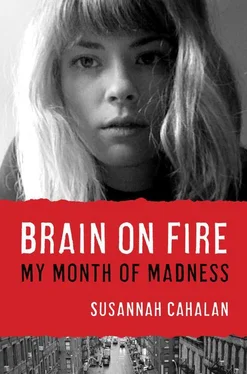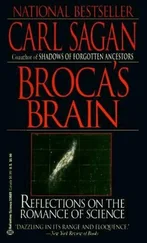Susannah Cahalan
BRAIN ON FIRE
My Month of Madness
Dedicated to those without a diagnosis
The existence of forgetting has never been proved: we only know that some things do not come to our mind when we want them to.
—FRIEDRICH NIETZSCHE
Because of the nature of my illness, and its effect on my brain, I remember only flashes of actual events, and brief but vivid hallucinations, from the months in which this story takes place. The vast majority of that time remains blank or capriciously hazy. Because I am physically incapable of remembering that time, writing this book has been an exercise in my comprehending what was lost. Using the skills I’ve learned as a journalist, I’ve made use of the evidence available—hundreds of interviews with doctors, nurses, friends, and family; thousands of pages of medical records; my father’s journal from this period; the hospital notebook that my divorced parents used to communicate with each other; snippets of video footage of me taken by hospital cameras during my stay; and notebooks upon notebooks of recollections, consultations, and impressions—to help me re-create this evasive past. I have changed some names and defining characteristics, but otherwise this is wholly a work of nonfiction, a blend of memoir and reportage.
Even still, I readily admit that I’m an unreliable source. No matter how much research I’ve done, the consciousness that defines me as a person wasn’t present then. Plus, I’m biased. It’s my life, and so at the core of this story is the old problem of journalism, made a hundredfold messier. There are undoubtedly things that I have gotten wrong, mysteries I will never solve, and many moments left forgotten and unwritten. What is left, then, is a journalist’s inquiry into that deepest part of the self—personality, memory, identity—in an attempt to pick up and understand the pieces left behind.
At first, there’s just darkness and silence .
“Are my eyes open? Hello?”
I can’t tell if I’m moving my mouth or if there’s even anyone to ask. It’s too dark to see. I blink once, twice, three times. There is a dull foreboding in the pit of my stomach. That, I recognize. My thoughts translate only slowly into language, as if emerging from a pot of molasses. Word by word the questions come: Where am I? Why does my scalp itch? Where is everyone? Then the world around me comes gradually into view, beginning as a pinhole, its diameter steadily expanding. Objects emerge from the murk and sharpen into focus. After a moment I recognize them: TV, curtain, bed.
I know immediately that I need to get out of here. I lurch forward, but something snaps against me. My fingers find a thick mesh vest at my waist holding me to the bed like a—what’s the word?—straitjacket. The vest connects to two cold metal side rails. I wrap my hands around the rails and pull up, but again the straps dig into my chest, yielding only a few inches. There’s an unopened window to my right that looks onto a street. Cars, yellow cars. Taxis. I am in New York. Home.
Before the relief finishes washing over me, though, I see her. The purple lady. She is staring at me.
“Help!” I shout. Her expression never changes, as if I hadn’t said a thing. I shove myself against the straps again.
“Don’t you go doing that,” she croons in a familiar Jamaican accent.
“Sybil?” But it couldn’t be. Sybil was my childhood babysitter. I haven’t seen her since I was a child. Why would she choose today to reenter my life? “Sybil? Where am I?”
“The hospital. You better calm down.” It’s not Sybil.
“It hurts.”
The purple lady moves closer, her breasts brushing against my face as she bends across me to unhook the restraints, starting on the right and moving to the left. With my arms free, I instinctually raise my right hand to scratch my head. But instead of hair and scalp, I find a cotton hat. I rip it off, suddenly angry, and raise both hands to inspect my head further. I feel rows and rows of plastic wires. I pluck one out—which makes my scalp sting—and lower it to eye level; it’s pink. On my wrist is an orange plastic band. I squint, unable to focus on the words, but after a few seconds, the block letters sharpen: FLIGHT RISK .
PART ONE
CRAZY

I have felt that odd whirr of wings in the head.
—VIRGINIA WOOLF,
A Writer’s Diary: Being Extracts from the Diary of Virginia Woolf
Maybe it all began with a bug bite, from a bedbug that didn’t exist.
One morning, I’d woken up to find two red dots on the main purplish-blue vein running down my left arm. It was early 2009, and New York City was awash in bedbug scares: they infested offices, clothing stores, movie theaters, and park benches. Though I wasn’t naturally a worrier, my dreams had been occupied for two nights straight by finger-long bedbugs. It was a reasonable concern, though after carefully scouring the apartment, I couldn’t find a single bug or any evidence of their presence. Except those two bites. I even called in an exterminator to check out my apartment, an overworked Hispanic man who combed the whole place, lifting up my sofa bed and shining a flashlight into places I had never before thought to clean. He proclaimed my studio bug free. That seemed unlikely, so I asked for a follow-up appointment for him to spray. To his credit, he urged me to wait before shelling out an astronomical sum to do battle against what he seemed to think was an imaginary infestation. But I pressed him to do it, convinced that my apartment, my bed, my body had been overrun by bugs. He agreed to return and exterminate.
Concerned as I was, I tried to conceal my growing unease from my coworkers. Understandably, no one wanted to be associated with a person with a bedbug problem. So at work the following day, I walked as nonchalantly as possible through the newsroom of the New York Post to my cubicle. I was careful to conceal my bites and tried to appear casual, normal. Not that “normal” means a lot at the Post .
Though it’s notoriously obsessed with what’s new, the Post is nearly as old as the nation itself. Established by Alexander Hamilton in 1801, it is the longest continually run newspaper in the country. In its first century alone, the paper crusaded for the abolition movement and helped promote the creation of Central Park. Today the newsroom itself is cavernous yet airless, filled with rows of open cubicles and a glut of filing cabinets packed with decades of unused, forgotten documents. The walls are freckled with clocks that don’t run, dead flowers hung upside down to dry, a picture of a monkey riding a border collie, and a big foam Six Flags finger, all memorabilia from reporters’ assignments. The PCs are ancient, the copy machines the size of small ponies. A small utility closet that once served as a smoking room now holds supplies, and is marked by a weathered sign warning that the smoking room no longer exists, as if someone might accidentally wander in for a cigarette among the monitors and video equipment. This has been my eccentric little world for the past seven years, since I started here as a seventeen-year-old intern.
Especially around deadline, the room buzzes with activity—keyboards clacking, editors yelling, reporters cackling—the perfect stereotype of a tabloid newsroom.
Читать дальше













